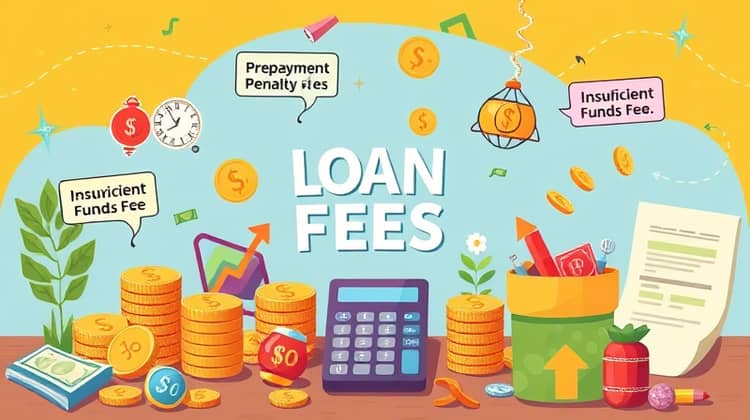In today's financial landscape, understanding personal loans and their associated fees is more crucial than ever. Many consumers find themselves in need of a financial boost for various reasons, such as consolidating debt, funding a major purchase, or covering unexpected expenses. However, the true cost of borrowing is not just about the interest rates that lenders advertise; it also encompasses various fees that can significantly impact your overall repayment amount.
Personal loan fees can vary widely among lenders and can sometimes catch borrowers off guard. Knowing what these fees are, how they are applied, and their potential impact on your finances is essential for making informed borrowing decisions. It's not uncommon for individuals to feel overwhelmed by the complexity of loan agreements, but taking the time to educate oneself can save money in the long run.
This article highlights the common personal loan fees and charges, emphasizing their importance and offering guidelines on how to navigate them effectively. By understanding these charges, borrowers can better assess loan offers and avoid hidden costs that could complicate their financial situation.
The Importance of Knowing Personal Loan Fees

When considering a personal loan, it's vital to understand all the fees involved beyond the stated interest rate. Many borrowers focus solely on lowering the interest rate but may overlook how additional fees can inflate their overall borrowing costs. Understanding these fees can make a substantial difference in the total amount repaid over the life of the loan.
Financial literacy encompasses knowing not only how much you can borrow but also the potential costs associated with the loan. Borrowers who are well-informed about these costs are better equipped to negotiate favorable terms and make decisions that align with their financial goals. It also ensures that there are no surprises after approval, which can lead to financial strain in the future.
Ultimately, being aware of personal loan fees is about empowerment; it allows borrowers to take control of their financial situations by choosing loans that fit their needs without being burdened by unexpected costs.
Common Personal Loan Fees and Charges

Personal loans often come with a variety of fees that can add to the overall cost of borrowing. Here are some common fees that borrowers should be aware of:
- Origination Fee
- Prepayment Penalty
- Late Payment Fee
- Insufficient Funds Fee
- Closing Costs
1. Origination Fee
An origination fee is a charge from the lender for processing the loan application and disbursing the funds. This fee is typically a percentage of the total loan amount, ranging from 1% to 8%. It can be deducted from the loan proceeds or included in the overall loan amount.
Understanding the origination fee is crucial, as it can significantly affect how much money you ultimately receive. For example, if you take out a $10,000 loan with a 3% origination fee, you'll end up with $9,700 after the fee is deducted, meaning you will owe interest on the full $10,000 despite receiving less.
- Read the fine print to understand if there are any origination fees.
- Compare different lenders to find ones with lower or no origination fees.
- Factor the origination fee into your total borrowing cost when making decisions.
2. Prepayment Penalty
A prepayment penalty is a fee charged by some lenders if you pay off your loan early. This fee is designed to protect the lender's expected interest income. Understanding this fee is vital because if you plan to pay off your loan ahead of schedule, this penalty could significantly increase your total repayment amount.
Not all lenders impose prepayment penalties. Borrowers should always inquire about this before signing any loan agreements and, if possible, choose lenders who don't charge this fee to avoid unnecessary costs. Checking the terms for prepayment can save money in the long run.
3. Late Payment Fee
A late payment fee is levied when a borrower fails to make a payment by the due date. This fee varies by lender but generally ranges from $15 to $30 for each missed payment. It can add up quickly if payments are consistently late, impacting your financial stability significantly.
It's important to note that being charged late fees can also affect your credit score, thereby increasing your overall borrowing costs in the future if lenders see a pattern of late payments.
- Set reminders for payment due dates to avoid late fees.
- Insist on automatic withdrawals from your bank account for timely payments.
- Communicate with your lender if you anticipate difficulty making a payment on time.
4. Insufficient Funds Fee
An insufficient funds fee occurs when you attempt to make a loan payment, but your account does not have enough balance to cover it. This fee can vary by lender, but typically it ranges from $30 to $50.
It's vital to keep track of your finances and ensure adequate funds are available in your account before payment dates to avoid these additional charges.
5. Closing Costs
Closing costs encompass a variety of fees involved in processing your loan, including the cost of paperwork, legal fees, and administrative fees. These costs can add another 2% to 5% of the loan amount to your total expenses, depending on the lender.
Before finalizing any loan, borrowers should request a detailed breakdown of closing costs and ensure they understand each expense. Keeping track of these costs is essential as they can significantly influence the overall affordability of the loan.
- Request a breakdown of closing costs from the lender in advance.
- Negotiate any closing costs you think are excessively high.
- Consider lenders who offer no closing costs or lower fees.
How to Avoid or Minimize Personal Loan Fees

Taking proactive steps can help you avoid or minimize personal loan fees, saving you money in the long run.
- Shop around for loans with competitive fees and terms.
- Read all loan agreements carefully to understand any potential fees.
- Negotiate with lenders for better terms or to waive certain fees.
Conclusion

Navigating personal loan fees and charges doesn't have to be overwhelming. By being informed about the various fees that can accompany personal loans, borrowers can make more educated decisions, ultimately leading to better financial health. Many people overlook the true cost of a loan, which includes both interest and fees, but this understanding is vital.
As a borrower, it's important to do your homework, compare lenders, watch for hidden fees, and ensure that you know what you're getting into before signing that loan agreement. This diligence can save you hundreds or thousands of dollars over time.














